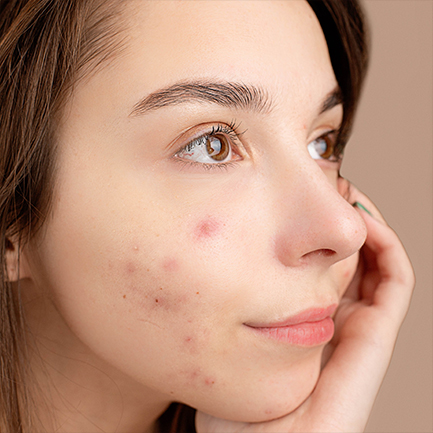Melasma
What is Melasma?
Melasma, also called ‘chloasma’ and ‘pregnancy mask’, is a common skin condition of adults in which brown or greyish patches of pigmentation (color) develop, usually on the face. The name comes from melas, the Greek word for black, or cholas, from the word green-ish. It is more common in women, particularly during pregnancy (when up to 50% of women may be affected). Sometimes men may also be affected. Melasma is more common in people of color and those who tan very quickly but can occur to anyone. Melasma usually becomes more noticeable in the summer and improves during the winter months. It is not an infection; therefore, it is not contagious, and it is not due to an allergy. It is not cancerous and will not develop into skin cancer.
What causes Melasma?

The exact cause is not known, but it is thought to be because of pigment producing cells in the skin (melanocytes) producing too much pigment (melanin). Several factors can contribute to developing melasma, including pregnancy and using hormonal drugs such as birth control pills and hormone replacement. Exposure to ultraviolet (UV) light from the sun and the use of sun-beds or phototherapy can trigger melasma or make it worse.
Can it be cured?
Unfortunately, no, at present there is no cure for melasma, but there are several treatment options that can improve the appearance. Even if it is treated, melasma can return after stopping the treatments, especially if routine/daily sun protection is not being used.
How do you treat Melasma?
The most important three treatments for melasma are – sun protection, sun protection, and some sunblock (more sun protection)
Honestly though, Dr. Contestable’s opinion is that without a great sun protection regimen we aren’t helping you achieve more lasting results, and are likely not going to be able to achieve the results that would be possible for you.
So, the steps of treatment are:
Step #1: Sun protection:
Sun protection starts with avoidance strategies (seeking shade), then clothing (wide brim hats), and finally sun block.
The most effective sun block for melasma contains at least 5% Zinc Oxide and also contains iron oxide. The iron oxide imparts pigment to the sun block – therefore the best sun blocks for melasma are “tinted”.
However, the most important aspect of sun block is ACTUALLY USING IT! If you find a tinted sunblock to be too difficult or not correct for every occasion then the next best option is one that at least has 5% Zinc oxide or more. Micronized zinc oxide found in a few brands (EltaMD) is much more cosmetically elegant and does not leave a white cast as many other zinc-based blocks do.

Chemical only sun blocks are also helpful so don’t fret if you feel you cant tolerate physical blockers (zinc oxide or titanium dioxide). Look for at least 30 SPF, broad spectrum (covers UVA and UVB), and water resistance. Remember to apply every morning and re-apply throughout the day. Use every 2 hours if outside.
Step #2: Skin lightening creams:
Hydroquinone is the most studied and most effective next step. It comes in many percentages – work with Dr. Contestable to find out what might be right for you.
Other topicals can also help such as: alpha arbutin, vitamin C, kojic acid, and topical Tranexamic acid – but these are really only adjuncts. It’s not unreasonable to look for these ingredients as “add-ons” in the morning. But they are not absolutely needed. Dr. Contestable believes in keeping it simple and sticks with what will really make a difference. Therefore, we focus on hydroquinone unless a patient would like to avoid that medication.
Step #3: Procedures:
Chemical peels, microneedling, light laser treatments, etc. are all reasonable treatments depending on the patient and the physicians experience. Melasma requires an intimate knowledge of skin pathology, treatments, and skin types (including different ethnic types and how they respond to treatment). Please ensure you are finding an experienced physician for this type of care. Melasma can be worsened by incorrect or aggressive treatments. Dr. Contestable recommends you look for a Board Certified Dermatologist or Board Certified Plastic Surgeon.
Add ons:
Oral Tranexamic acid has shown reasonable promise in some patients. Dr. Contestable will discuss if this is a good option for you depending on your health history.
Source: American Academy of Dermatology (https://www.aad.org/public/diseases/a-z/melasma-overview)
For Physicians only (or patients of Dr. Contestable) – “Melasma – Patient Handout”

